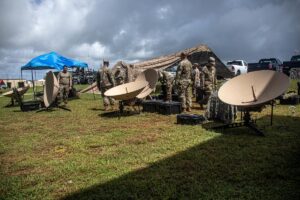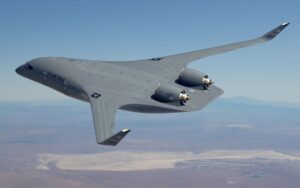
HUNTSVILLE, Ala. — The Defense Department’s top research and engineering official told reporters Wednesday the department is working on a new approach for the Redesigned Kill Vehicle (RKV) but was unwilling to provide details.
Michael Griffin, the Pentagon’s under secretary of defense for research and engineering, said he did not intend to provide more information beyond the initial stop-work order press statement.

“I’m not going to go beyond that, sorry. I mean we are working on what comes next absolutely, but I’m just not going to provide any more details,” Griffin said.
RKV intends to improve the reliability of the Ground-based Midcourse Defense (GMD) system Ground-Based Interceptors (GBI). The GBIs consist of a rocket launched toward ballistic missile threats to the U.S., then the seeker and kill vehicle collide with the threat to destroy it outside the atmosphere.
There are currently 44 GBIs, the vast majority at Ft. Greely Alaska. The Missile Defense Agency (MDA) intends to build another 20, all featuring the RKV. This delay is also delaying installation of additional GBIs.
Griffin said the Pentagon plans to produce and deploy these additional newer generation GBIs because older ones are dealing with issues like parts obsolescence. However, “we stopped work on RKV for technical reasons, but I’m not going to discuss it further.”
However, he admitted, “we will be coming forward with a new approach, but we’re not ready to talk about it.”
In March, the MDA announced a two-year delay in the RKV program because it needed to reschedule the Critical Design Review (CDR) from originally planned in 2018 to 2020 (Defense Daily, March 12).
However, in May, Griffin directed MDA to issue a stop-work order to prime GBI contractor Boeing [BA] due to an unspecified technical issue. At the time, DoD said once Griffin received the results of tests of suspect components he determined the current plan was not viable and started an analysis of alternatives (Defense Daily, May 24).
“I think it was the right decision to pause the program, I call it a strategic pause, to make sure we were doing things right,” MDA Director Vice Adm. Jon Hill said on Thursday.
Hill said the department is looking at “a total range” of options.
“It’s a department-level decision that hasn’t been made yet. But I will guarantee you that we are going to look at the full range and we’re going to try to minimize that time it takes to deploy and maximize the capability,” Hill added.
An annual Government Accountability Office (GAO) report on missile defense later revealed design issues could increase costs by up to $600 million (Defense Daily, June 6).
Additionally, the RKV program could not meet FY 2018 cost and schedule milestones once it was accelerated by the DoD Missile Defeat and Defense Enhancements Appropriations Act of 2018 (MDDE) (Defense Daily, Dec. 21, 2017).
GAO found Boeing reported accruing negative cost and schedule variances, inefficiencies from bringing large numbers of new staff on board, and requiring more personal than anticipated. Then, the program found “some critical components would not meet performance requirements”, causing the CDR delay.
Raytheon [RTN] is the developed of the RKV, working under the prime contractor within the larger GMD and GBI program.

 By
By 










